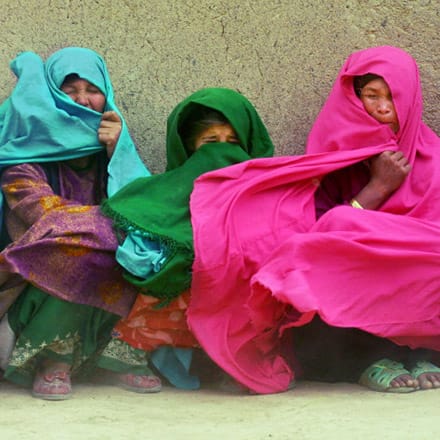A recipe for happiness for persecuted Hazara
Colourful scarves, delicious bread and a proud sense of community are all everyday aspects of the Hazara community in Dandenong, now thriving a world away from the persecution this group has suffered over the centuries.

Colourful scarves, delicious bread and a proud sense of community are all everyday aspects of the Hazara community in Dandenong, now thriving a world away from the persecution this group has suffered over the centuries.
By UMA MUTHIA
The smell is captivating. There is no choice but to follow the wafting scent of freshly baked naan, down to a small, humble bakery. In return for $1.50, a smiling baker hands over a generous serving of this traditional Afghani bread, straight out of the oven.
It is warm, soft, chewy and rich. On this Friday afternoon, dark clouds hover above Dandenong, but the mood on the streets is bright. The footpath is bustling with people coming to and from the Afghan halal grocery stores, kebab eat-in shops and Persian rug stores.

Melodious conversations in Dari, the variety of Persian commonly spoken in Afghanistan, can be heard on every corner.
Colourful headscarves worn by women flutter in the wind while men dressed in traditional Afghan costume idly stroll in small numbers. There is a strong culture on Thomas St that emulates the Afghan markets of Ghazni or Kabul.
These are the Hazara people. The term Hazara may be unfamiliar to many Australians, despite the rapidly growing population of this group. Most have come to this country seeking refuge from violence, which they face on an extraordinary scale.
The Hazara are often described as one of the most persecuted ethnic groups on the planet, a victimisation that has gone on for centuries. Most live in central Afghanistan, though both Pakistan and Iran have large populations, many of them also refugees.
Australia is now home to about 20,000, with about 9000 of these living in Melbourne's southeast.
In Afghanistan the Hazara form the third largest ethnic group (after the Pashtuns and Tajiks) but rest on the bottom rung of the fragmented social system. This ranking is based on two primary reasons – the Hazara look different and believe differently.
The majority of the Hazara adhere to Shia Islam; Afghanistan’s other major ethnic groups are mostly Sunni. This religious difference has resulted in discrimination and persecution against the Hazara people for many years.
Their physical appearance, reflective of their ethnicity, has made them identifiable targets of violence within Afghanistan. The Taliban takeover only worsened the situation, executing mass attacks against them, kidnappings, threats and torture.

As the most oppressed and most mistreated ethnic minority in Afghanistan, many choose to flee.
That was the decision made by many of the Hazara population in Dandenong today. “Taliban is not good for Hazara people. They don’t like us, always killing us. I don’t know why,” says Dandenong resident, Hadi, who came to Australia three years ago seeking asylum.
But Australia is not the first destination in this exodus. Darokshan Groceries store employee Mysam first left Afghanistan as a teenager because of safety issues. His first stop was neighbouring Pakistan, which hosts a large number of Afghan refugees. The current estimate is 1.6 million.
“Pakistan is no different to Afghanistan for Hazara people,” he says. The attacks and killings against the Hazara in Pakistan caused Mysam to flee again after two years, following his father to Australia in 2004.
Dandenong resident Taoos Alimi fled the violence in Afghanistan at the age of 15. Alimi and his family settled in Pakistan. Now in his 40s, a recent escalation in violence against his ethnic group made him realise life in Pakistan was no different to the life he fled in Afghanistan. He fled again, jumping on a boat heading to Australia in 2012.
His plan was simple: come to Australia, gain refugee status and then apply for his family to join him. “That was the plan,” he says. Yet while his situation here is good, Taoos admits that his life is still very hard.
“Why? Because my family is in Pakistan. They not safe. I don’t know what happens to them,” he says.
The Hazara community living in the Pakistani city of Quetta have been victims of violence by the Pakistani Sunni Muslim extremist militant group Lashkar-e-Jhangvi.
Human Rights Watch estimates that, in recent years, at least 2000 defenceless Hazara men, women and children have lost their lives in ethnic and religious-based violence. In neighbouring Iran, the vicious cycle of discrimination continues for the Hazara refugees who are seen as inferior and ethnically different, despite holding the same religious beliefs as the majority Shia population.
The result has been mass emigration from the region in pursuit of a safe haven. “I heard that Australia is safe country, the people is good and they are kind,” says Alimi when asked why he chose to come to Australia.

Alimi is on a bridging visa that grants him temporary residence with no working allowance.
To pass time, Alimi makes the most of his stay by attending several English classes provided by the government, and church groups, meeting with friends and simply walking around the local streets.
On this Friday afternoon in Dandenong, the threat of rain is a minor inconvenience for a group that grew up with almost no freedoms.
The Hazara are taking the time to enjoy doing things they feared in Afghanistan, such as publicly gathering in small groups simply to chat and socialise.
Speaking about his life in Australia, Sadaqat Superstore employee Asghar Ali says: “It’s very good, it’s fantastic, I work, I go to school, I learn English … I really like it.”
Ali has only been in Australia for a few months after living most of his life in Pakistan. He fled Quetta “because of the violence and because I am Hazara”. He came to Australia knowing that people here respect the laws and that it was a “good country”.
The Hazara people in Dandenong have steadily contributed to the diversity of this municipality, where they have re-created a vibrant and thriving community that showcases Afghan culture.
As they go about their business, laughing, smiling and talking, it is hard to believe that these people are victims of some of the worst atrocities in the world. But much like the smiling baker, it seems that Australia has provided the Hazara with a simple recipe for happiness – the right not to be persecuted on the basis of appearance or religion.
For Mysam, it is a happy ending: “If I’m not happy here, I’m not going to be happy anywhere else.”





